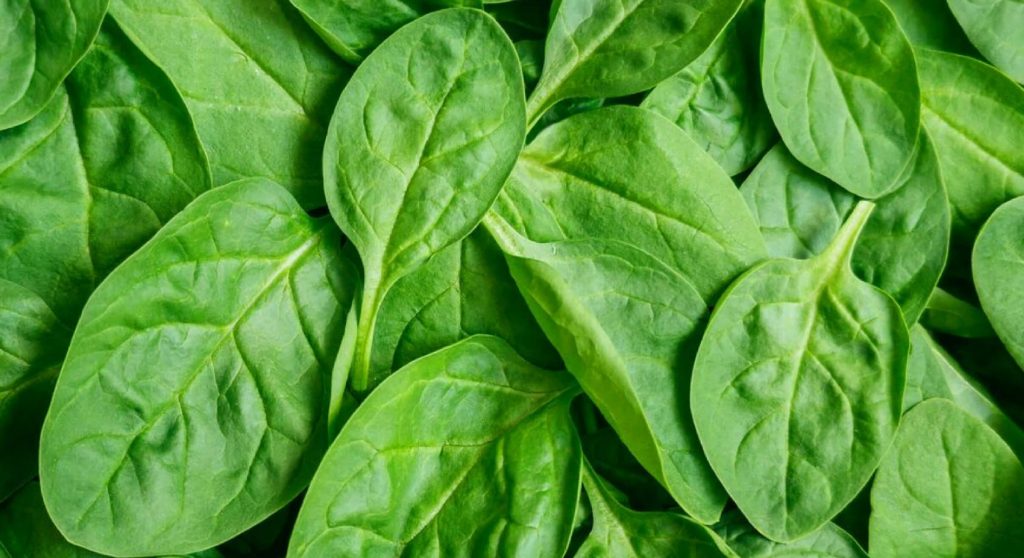Whenever I eat spinach, I think of Popeye. I can picture the little cartoon right now – a sailor with big arm muscles, reaching for a can of spinach to help him stay super strong! This popular leafy green is a nutritional powerhouse that offers up a variety of key vitamins, minerals, and antioxidants. It’s no wonder it’s linked to a long list of health benefits! Plus, if you ask me, when prepared just right, it’s quite tasty. If spinach usually earns a spot on your grocery list, you may have questioned: Can my dogs eat spinach too?
Short answer: For the average dog, yes. But, there are some things you should know first.
A Look at the Nutritional Value
Spinach is a leafy green flowering plant that belongs to the Amaranthaceae family, meaning it’s related to beets, Swiss chard, and quinoa.
When feeding this nutritional powerhouse to your pooch, moderation is key. We’ll go over why below. But, first, let’s take a look at the many nutrients it packs inside.
According to the U.S. Department of Agriculture, 1 cup of raw spinach (about 30 g) touts:
- Water – 27.4 g
- Calories – 6.9
- Protein – 0.858 g
- Total fat – 0.117 g
- Carbs – 1.09 g
- Fiber – 0.66 g
- Sugar – 0.126
- Calcium – 29.7 mg
- Iron – 0.813 mg
- Magnesium – 23.7 mg
- Phosphorus – 14.7 mg
- Potassium – 167 mg
- Sodium – 23.7 mg
- Zinc – 0.159 mg
- Manganese – 0.269 mg
- Choline – 5.79 mg
- Folate – 58.2 µg
- Lutein + zeaxanthin – 3660 µg
- Beta Carotene – 1690 µg
- Vitamin A – 141 µg
- Vitamin B-6 – 0.058 mg
- Vitamin C – 8.42 mg
- Vitamin E – 0.609 mg
- Vitamin K – 145 µg

The Benefits
- Aids a Strong Immune System – Spinach is rich in various vitamins, minerals, and antioxidants that support a strong immune system. Experts say spinach provides flavonoids, which are a type of powerful antioxidant that helps protect the body against disease by fighting free-radical damage.
- Anti-Inflammatory Properties – Thanks to the many antioxidants in spinach, this veggie is known to help fight and lower inflammation. Did you know chronic inflammation is at the root of almost all disease?
- Supports Heart Health – This is thanks to the anti-inflammatory benefits I mentioned just a second ago! Plus, eating a healthy amount of dietary fiber, potassium, and magnesium also offers up heart-health benefits.
- Eye Health – The Beta Carotene in this superfood (which the liver converts to Vitamin A) aids in maintaining and improving eye health. Experts say the eye health benefits in spinach also come from the carotenoids Lutein + zeaxanthin. They’re said to protect a dog’s retina — the light-sensitive inner wall of the eye — from oxidative damage.
- Blood – Spinach offers up high amounts of vitamin K, which aids the overall health of blood (it plays a role in clotting and beyond).
- Bone Health – Vitamin K is also an essential bone-building vitamin.

An Important Note
Along with the many benefits listed above, spinach does have one drawback. This leafy green contains oxalates (a naturally occurring substance that is found in other veggies, like kale). Oxalates block the body’s ability to absorb calcium and can aid in the formation of kidney and bladder stones when consumed in large quantities. While many experts agree that a dog would have to eat a very large amount of spinach to cause issues, it’s best for some dogs to avoid spinach. For example, if your pup is prone to kidney and bladder stones, spinach shouldn’t be on their menu.
Even if your dog isn’t prone to kidney and bladder stones, it’s best to feed spinach in moderation and constantly rotate this leafy green with other nutrient-rich veggies. In general, canine nutrition experts say veggies should make up less than 10% of your dog’s diet. So what is 10%? Well, that depends on your dog’s size. In general, a couple of bite-sized pieces are totally fine and healthy!
Feeding Tips
Experts recommend buying organic spinach and washing it well before feeding it to your dog (or you!).
When preparing it for your pooch, the best is to chop it (or, better yet, puree it) and steam it. Boiled spinach is said to lose most of its nutrients, and raw spinach can be more difficult for our dogs to digest. Additionally, while you may load up your helping with yummy spices, it’s best to keep your dog’s portion plain.
Add a little steamed spinach to your pup’s meals or chop it up and add to homemade treats. I like adding them to biscuits, my Puppy Frittatas, and even protein-filled bites (add some chopped spinach to these Doggy-Approved Turkey Meatballs or swap the broccoli for chopped greens in my Salmon Muffins treat).

As stressed throughout this article, moderation and veggie rotation is key. When it comes to offering this leafy green to your pooch, make sure to review your dog’s diet with a zoomed out lens. For example, if your dogs have cooked spinach in their main meals, don’t include it in their homemade treats.
As with any new food, introduce it slowly into your dog’s diet to see how he handles it. If you have any questions or concerns, speak with your veterinarian.
Get More Doggy Food Facts
This feature is part of a weekly web series called Food Facts Friday. Every Friday, we share foods that are great for our canine companions. Check out other foods highlighted in this series HERE!








